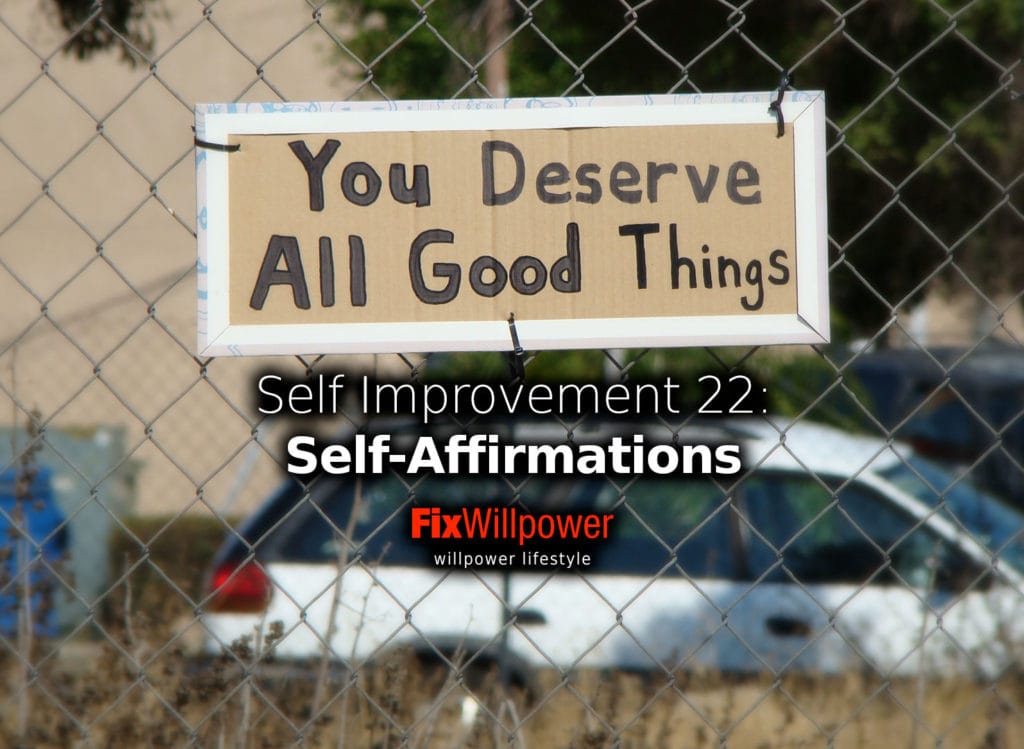Do you want to become a better version of yourself?
People have used self-affirmations for ages and found them working to improve their overall well-being.
For example, positive affirmation has stress-protective effects.
Self-affirmations do not mean you have to repeat “I can do it!” to yourself constantly. Find out how to make yourself mentally tougher and reinforce your core values.

At some point self-affirmations got a bad rap.
There was not much scientific evidence about the workings of self-affirmations. Now there is a growing body of evidence on the benefits of self-affirmation.
As with many other things where science is just starting to make inroads, there’s also an opposing view. Some research suggests that self-affirmations don’t work if you know you are doing it. In this case, you can at least make it work on your family and friends.
The other thing is that self-affirmations might not work on people with low self-esteem. People who have low self-esteem and say, “Everyone loves me” may feel worse off afterward.
The key lies in making affirmations believable and not too over the top with positivity. Try, “This specific person loves me.” No research behind this last statement, just my guess.

Believe in your heart that you’re meant to live a life full of passion, purpose, magic and miracles. ~ Roy T. Bennett
So, what are the benefits of self-affirmation?
Boost your willpower with self-affirmation. Research by Schmeichel and Vohs has shown that affirming core values counteracts ego depletion. Experiments found that self-affirmation has beneficial effects on self-control in a depleted state. Self-affirmation improves self-control by promoting higher levels of mental construal. The self-affirmation trick didn’t work on the people not yet depleted. Self-affirmation, therefore, holds promise as a mental strategy that reduces the likelihood of self-control failure.
Reflecting on the time you had power will make you more confident in professional interview outcomes (Joris Lammers). They asked participants to write about high-power situations in their lives before writing a job application letter of being interviewed for admission to business schools.
Independent judges, who were unaware of the existence of the power manipulation, significantly preferred the written and face-to-face interview performance of the applicants who had written power affirmations. The judges’ feeling of the applicant’s persuasiveness led to the preference of power-primed applicants.
To sum it up, just asking people to remember a personal experience with power dramatically changed the impressions that interviewers had of them.
Simple self-affirmation can reduce social anxiety and improve social behavior for up to two months (Danu Anthony Stinson). In social situations, people often behave in ways that lead to the rejection that they actually fear. Self-affirmation can improve individuals’ security in relationships, and this improvement will allow them to express more welcoming social behavior.
In an experiment, a 15-minute self-affirmation improved both the relational security and social behavior of participants. Effects lasted up to 4 weeks after the initial affirmation exercise. The extent to which self-affirmation improved participants’ relational security after 4 weeks predicted additional improvements in social behavior 4 weeks later. Participants continued to get the social benefits of self-affirmation up to 8 weeks after the first exercise.
Self-Affirmation improves problem-solving under stress. A study shows that positive affirmation has stress-protective effects. It also showed that self-affirmation can buffer the effects of chronic stress in actual problem-solving. The results also suggest that self-affirmation may be effective at boosting performance in academic tasks requiring associative processing and creativity, particularly for students who experience stress on such tasks.

The ancestor of every action is a thought. ~ Ralph Waldo Emerson
Positive affirmation exercise
Self-affirmation exercise does not mean that you have to repeat to yourself that you are the best.
One method for positive affirmation that the researchers used was to ask the participants to list their core values and then write a few paragraphs on their most important value.
The list might look something like this:
- Family
- Career and business
- Helping friends
- Teaching others
- Health and fitness
- Meaning and changing the world
Your list may be similar or have other aspects of life in it. But this doesn’t matter much. Just write about your most important values and try to remember stories when you acted according to those values.
Here are some general affirmations you can create in each of those fields. I wrote down some general ideas. Use the examples as templates and make your self-affirmations specific to each person or the topic you want to work with.
1. Family
Here are some areas you should think about when interacting with your family. The goal is to make yourself remember how you need to act, and improve the lives of people around you.
- I help my son in a way that lets him learn the lessons he needs.
- I am a calm and loving spouse for my partner.
- I take the responsibility the family needs and then some to make others load smaller.
- I encourage my family members in all their undertakings.
- I take time and be present when a family member needs support.
2. Career and business
Business and career goals mostly relate to the material world. How to be more productive, how to get more done in less time, but also how to put in more than others and get exceptional results. This may be something you need to do yourself or help others to achieve a common goal.
- I get one new client every week/month, etc. Whatever makes sense in your field.
- I increase my income to exceed my expenses.
- I create a safety fund that I can use in the case of setbacks and delays.
- I help my colleagues to reach their goals.
- I focus and be present, giving it my all every day.
- I work as much as needed and a bit more to reach my goals.

I’m good enough; I’m smart enough. Self-affirmation is where people list their core values. These are things that really make them who they are. ~ Amy Cuddy
3. Helping friends and teaching others
Give a man a fish or teach him to fish. Change people’s lives for the better by giving them tools to help themselves and others.
- I am open to my friends’ problems and help when I can.
- I teach others to get better and more skilled in all the fields I can.
4. Health and fitness
You can’t help anybody if you are not in shape. Make sure you stay physically fit and set goals that move you in that direction. You don’t have to run marathons but moving every day is a must. Build a habit that will take you through your life with maximum energy.
- I get my weight to X pounds and keep it there.
- I run a marathon within the next X months or years.
- I exercise every day, even if it’s just walking for 30 minutes.
- I only eat foods that are good for me.
- I avoid all fast carb, sugar, flour, starch.
5. Meaning and changing the world
You may not win the Nobel prize. You may not even become the community leader in your area. But you may be the best mother or father your kids could have. And then in years when they interact with other people, they will understand that you were probably the best thing that ever happened to them.
- I make the life of the people around me easier.
- I tell the truth.
- I find ways to make the world a better place.
Self-affirmation doesn’t have to relate to the area in which you’re looking to improve your performance. So, thinking about your great results as a marathon runner will improve your performance on a job interview.
You can expand the self-affirmation habit with identifying and committing to our core values in life. After clarifying your values, commitment to an alignment of values and behavior will help you improve your happiness levels.

I’m proud of myself for doing my best. That’s all anyone can ask of me. ~ Stefanie Weisman
Second and third-person self-affirmations
There’s some research that second and third-person self-talk is even more effective in convincing yourself. To make sure you get the maximum results possible, use all three options:
- I can …
- John, you can …
- John is …
Now, before you get into the next situation, that may take a toll on your mental facilities, do the simple self-affirmation exercise.
Check out the most effective way to spend $500 on self-improvement.
Self-affirmation in your daily life
How to make self-affirmations a part your life so you would reap all the benefits.
Daily Journaling
You can integrate self-affirmations in your life in a form of journaling. Take a notebook and every night write down what you did that day. Focus on your top values and what you did according to those values that day.
Just a few lines every day would be OK. Something like this: Today I helped my friend with his X. It is really important for me to help my friends and family, to help them grow and improve their lives.
Weekly core values session
Another option is less frequent but more substantial. Write a few paragraphs or a page once every week about your core values and why they are important to you.
Self-affirmations go hand in hand with the practice of giving yourself credit for the accomplishments you have in your life. When you create your one-liner self-affirmations, anchor them in your past achievements.
Always remember you have reached a lot of goals and done things you can be proud of.
Write those down too, so when you hit a rough patch then you have something positive to focus on.
_____________________________
Image: You Deserve All Good Things by The Sean & Lauren Spectacular
Image: Ralph Waldo Emerson Rowse Schloff by Stephen Alonzo Schoff (1818–1904) from an original drawing by Samuel W. Rouse (1822–1901)
![Read more about the article Call An Old Friend to Keep in Touch and Build Your Network [STEPS]](https://fixwillpower.com/wp-content/uploads/call-an-old-friend-429x314.jpg)

![Read more about the article How Bonuses Reduce Motivation and Productivity [2 VIDEOS]](https://fixwillpower.com/wp-content/uploads/motivation-bonuses-429x314.jpg)

Pingback: How to Stop Your Negative Self-Talk [in 4 Easy Steps] - @FixWillpower
Pingback: The Skill of Self Confidence by Dr. Ivan Joseph [TED VIDEO] | Fix Willpower
Pingback: Improve Your Life #29: Fake It Till You Make It | Fix Willpower